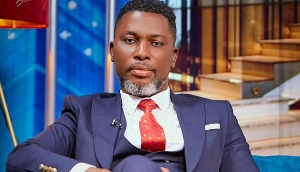- Home - News
- TWI News | TV
- Polls
- Year In Review
- News Archive
- Crime & Punishment
- Politics
- Regional
- Editorial
- Health
- Ghanaians Abroad
- Tabloid
- Africa
- Religion
- Election 2020
- Coronavirus
- News Videos | TV
- Photo Archives
- News Headlines
- Press Release
General News of Tuesday, 11 December 2001
Source: Accra Mail/BBC
How Annan Did Us Proud
Yesterday United Nations Secretary-General Kofi Annan received the Nobel Peace Prize and issued a clarion call for the rights of the individual, declaring that "the sovereignty of states must no longer be used as a shield for gross violations of human rights".
Mr Annan was speaking at a gala ceremony in the Norwegian capital Oslo where he and the United Nations were jointly presented with the 100th Nobel Peace Prize. In the audience were his wife Nane and Ghanaian President Agyekum Kufuor.
"What begins with the failure to uphold the dignity of one life, all too often ends with a calamity for entire nations," he said. Mr Annan and the UN received the award from the Nobel committee for their work "for a better organised and more peaceful world".
The presentation ceremony was attended by a number of former laureates including Tibet's Dalai Lama, South African Bishop Desmond Tutu and Northern Irish First Minister David Trimble.
To accept the prize Mr Annan was joined by South Korean Foreign Minister Han Seung-soo, President of the United Nations General Assembly.
Calling the 20th century the deadliest in history, Mr Annan said "we have entered the third millennium through a gate of fire".
But he said that, "if today, after the horror of 11 September, we see better, and we see further, we will realise that humanity is indivisible" with "bonds that bind us all in pain as in prosperity."
He said he believed the mission of the UN in the 21st century would be defined by "a new, more profound awareness of the sanctity and dignity of human life, regardless of race or religion."
He outlined the three key aims of the UN in the future - eradicating poverty, preventing conflict and promoting democracy.
Quoting from the Koran, Confucius, the Jewish Talmud and the Christian gospels Mr Annan pleaded for tolerance, saying the notion that one particular faith is better than another had led to some of the greatest horrors in human history.
Mr Annan said that the UN had been founded on the ashes of World War II, but reminded listeners that the horrors of war had not subsided, citing the 1994 genocide in Rwanda and the war in Bosnia.
Survivors of massacres in Rwanda and Bosnia were among the few who criticised the decision to give him the prize - he had been head of UN peacekeeping at the time.
"Today's real borders are not between nations, but between powerful and powerless, free and fettered, privileged and humiliated," he said.
"Today, no walls can separate humanitarian or human rights crises in one part of the world from national security crises in another."
In accepting the award Mr Annan acknowledged the work done by UN workers throughout the world who have dedicated their lives to peace.
The award, named after its founder Alfred Nobel of Sweden, was first given in 1901, when it was presented to Henri Dunant, the Swiss founder of the Red Cross, and French peace campaigner Frederic Passy.
The prize now comprises a gold medal, diploma and a cheque for 10m Swedish crowns ($953,500). Here in Ghana, there's been much joy and as reported in yesterday's Accra Mail, the government would be naming a monument after him in the nation's capital.
All You Need to Know About the Nobel Prize
--- Grolier EncyclopediaAlfred Nobel left most of his fortune in trust, as a fund from which annual prizes would be awarded to those who, each year, conferred "the greatest benefit on mankind." The prizes, awarded since 1901, are administered by the Nobel Foundation in Stockholm. The prizes designated in Nobel's will were for physics, chemistry, physiology or medicine, literature, and peace. In 1969 a prize for economics endowed by the Central Bank of Sweden was added. Recipients in physics, chemistry, and economics are named by the Royal Swedish Academy of Sciences; those in physiology or medicine by the Caroline Institute; those in literature by the Swedish Academy; and those who contribute to peace by the Norwegian Nobel Committee appointed by Norway's Parliament.
The average value of each prize began at about $30,000 and was about $1.12 million in 1996. Nobel laureates in literature have included historians, critics, and philosophers as well as novelists, poets, dramatists, and essayists. The peace prize has been awarded to individuals and to organizations.
Alfred Nobel
Alfred Bernhard Nobel, b. Oct. 21, 1833, d. Dec. 10, 1896, was a Swedish chemist, inventor, and industrialist whose most important invention, the explosive dynamite, earned a fortune for its inventor and provided the financial basis for the establishment of the Nobel Prize. With his father, Immanuel, himself an inventor and industrialist, Alfred Nobel began to manufacture nitroglycerin in a factory near Stockholm in 1862. An explosion in 1864 killed five people, including Nobel's young brother, Emil. Searching for a safe way of handling nitroglycerin, Nobel discovered that an organic packing material "such as kieselguhr, the diatomaceous earth he eventually used" absorbed the liquid in nitroglycerin, reducing its volatility. In 1867 he patented this mixture under the name dynamite. In 1875, Nobel perfected blasting gelatin, which possessed more blasting force and greater stability than pure nitroglycerin. He introduced the smokeless powder ballistite in 1887. A skillful entrepreneur who received more than 355 patents, Nobel left most of his fortune to a foundation established for the awarding of the prizes that bear his name.
The UN Secretary General has won the Nobel Peace Prize before
Dag Hjalmar Agne Carl Hammarskjold, b. July 29, 1905, d. Sept. 18, 1961, was a Swedish statesman who served as the second secretary-general of the United Nations (1953-61). The son of a former prime minister of Sweden, Hammarskjold studied law and economics and taught for three years before entering the Swedish civil service. He soon acquired an international reputation as a monetary expert. In the years of economic readjustment following World War II, he represented Sweden at many international conferences.
In 1951 he joined the Swedish delegation to the United Nations, becoming its chairman in 1952. When Trygve Lie resigned as secretary-general in 1953, Hammarskjold was elected to succeed him. He was an active international peacemaker of great moral authority and sensitivity. He helped resolve the Suez crisis of 1956 and the 1958 crisis in Lebanon and Jordan. In 1960, with the onset of the Congo crisis, he sent a UN peacemaking force into that country (now Zaire), a move that was strongly attacked by the USSR. Hammarskjold was killed in a plane crash while on a peace mission to Katanga in the Congo. He was posthumously awarded the Nobel Peace Prize for 1961. His writings include Markings (1964), a book of personal reflections.
Other people that have won the Nobel Peace Prize include Nelson Mandela, F.W. de Klerk, Yasser Arafat, Yitzak Rabin, Michael Gorbachov, Martin Luther King Jr., Mother Teresa and others










